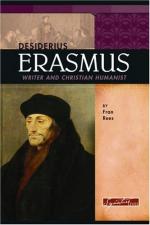|
This section contains 4,485 words (approx. 15 pages at 300 words per page) |

|
SOURCE: Rummel, Erika. “Erasmian Humanism in the Twentieth Century.” Comparative Criticism 23 (2001): 57-67.
In this essay, Rummel classifies the realms of Erasmus's influence in terms of philology, theology, pedagogy, and civility (a blend of the philosopher's commitments to community, tolerance, and peace). Rummel contends that except for a resurgence of interest in Erasmus as a theologian, most modern “Erasmian” movements are not related closely enough to the original and unique thought of Erasmus himself to qualify as truly modern Erasmianism.
In 1996 the participants in a conference at Groningen, entitled ‘Erasmianism: Idea and Reality’, attempted to define the essence of Erasmian thought and to gauge its influence on our time. In the opinion of the keynote speaker, Cornelis Augustijn, there was little evidence of any direct influence of Erasmus' ideas. Of course people cited Erasmus ‘when they found something in him that moved them’, but this did not mean that...
|
This section contains 4,485 words (approx. 15 pages at 300 words per page) |

|


